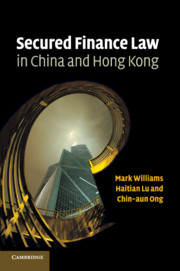Book contents
- Frontmatter
- Contents
- Preface
- Table of cases
- Table of legislation
- 1 Introduction
- 2 Security over tangible personal property
- 3 Security over intangible personal property
- 4 Company security over personal property
- 5 Hire-purchase, leasing and conditional sale of tangible personal property
- 6 Priority of security interests over personal property
- 7 Enforcement, and creditor's remedies
- 8 Conclusion
- Index
- References
5 - Hire-purchase, leasing and conditional sale of tangible personal property
Published online by Cambridge University Press: 03 May 2011
- Frontmatter
- Contents
- Preface
- Table of cases
- Table of legislation
- 1 Introduction
- 2 Security over tangible personal property
- 3 Security over intangible personal property
- 4 Company security over personal property
- 5 Hire-purchase, leasing and conditional sale of tangible personal property
- 6 Priority of security interests over personal property
- 7 Enforcement, and creditor's remedies
- 8 Conclusion
- Index
- References
Summary
Introduction
Previous chapters have explained how traditional security devices – such as legal mortgages strictu sensu, equitable mortgages, charges and pledges – are created, perfected and publicised, where relevant, over various types of tangible and intangible personal property. This chapter focuses on the quasi-security devices, namely the hire-purchase, lease and conditional sale agreements in Hong Kong and China.
The nature of a hire-purchase agreement is well settled. Chitty defines the hire-purchase agreement
as an agreement under which an owner lets chattels of any description out on hire and further agrees that the hirer may either return the goods and terminate the hiring or elect to purchase the goods when the payments for hire have reached a sum equal to the amount of the purchase price stated in the agreement or upon payment of a stated sum.
A less elaborate definition, but with the same meaning, is given by Goode: ‘[a] hire-purchase agreement as known to common law may be defined as a contract for the delivery of goods under which the hirer is granted an option to purchase the goods’. The Hong Kong Law Reform Commission's Report on Contracts for the Supply of Goods (2002) adopted a refined version of Goode's definition and gave a concise description of hire-purchase as follows: ‘a hire-purchase agreement is an agreement, or a combination of agreements, by which goods are supplied on hire and the hirer has the right but not the obligation to buy the goods’.
- Type
- Chapter
- Information
- Secured Finance Law in China and Hong Kong , pp. 219 - 267Publisher: Cambridge University PressPrint publication year: 2010



